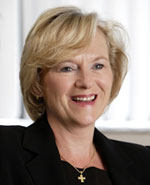OKLAHOMA SPOTLIGHT
Coming Home
In January 2006, Oklahoma's Secretary of Commerce and Tourism, Kathryn Taylor, resigned her cabinet post to run for mayor in her home town of Tulsa. On April 4th, Taylor was elected the 38th mayor of the Oil Capital of the World, having run on a platform of bringing a more business- like approach to running city government.
The mayor's extensive experience in the business world affords her a thorough understanding of the factors that drive business decisions at multinational corporations. Site Selection Editor Mark Arend met with the mayor in late May; following are excerpts from their conversation.
How is the Tulsa region benefiting from your stint at the helm of the Commerce Department?
It's not just my ties to the Department of Commerce, but it's the governor's office, the Departments of Transportation and Environment – all my fellow cabinet secretaries I can reach immediately, and they me if
 |
| Tulsa Mayor
Kathryn L. Taylor |
What are your priorities as Mayor, and how are you adjusting to your new constituency?
We are focused on redeveloping downtown and the river, because that brings a quality of life and quality of work force that businesses are looking for. As a top priority we are making our processes at the city that our citizens and businesses interact with more outcome- measured so they are user- friendly, whether it's permitting or utilities or finding out what's going on with the city – much like I did at the state level.
It's a smaller geographic area but an exciting one, because of the Vision 2025 initiative [a set of community- improvement projects funded by a penny sales tax], which is a $250- million investment the city is making in itself (www.vision2025.info). Those projects are now coming out of the ground all over the area, including the 18,000- seat events center designed by Cesar Pelli. As the arena will be completed in 2008, we are planning now for additional hotels and sites. This city will really take off within the next two years.
The aerospace and telecommunications industries are thriving in Tulsa, but are there others you hope to see emerge as clusters under your watch?
Healthcare research and the healthcare facilities that are spawned from that are areas that are really shining due to their ties to the local higher education and the concentration of those resources within the community. Tulsa now has the largest community foundation in the nation. There are communities much larger than we are that have smaller community foundations. Tulsa is solidifying its business base.
Energy, environmental and natural resources are still quite significant parts of the landscape here, and people sometimes forget about that.
How is the work force in the region preparing for the business world of tomorrow?
Supporting our existing businesses, making sure our processes are business friendly and increasing the quality of life will help us retain and attract a quality work force. We have five institutions of higher education within the city of Tulsa, and keeping those students here is important. We're at about a 4- percent unemployment rate, so it's important that we continue to invest in education so we can provide a qualified work force. The advanced materials research facility at Oklahoma State University- Tulsa, for example, will benefit the aerospace industry will be up and running within the next 12 months.

